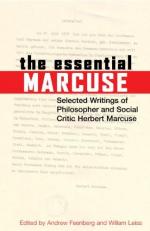|
This section contains 937 words (approx. 4 pages at 300 words per page) |

|
Herbert Marcuse (1898–1979) was born in Berlin on July 19. After earning a doctorate in literature in 1922, he studied philosophy with Martin Heidegger (1889–1976) in Freiburg from 1928 to 1933. Troubled by Heidegger's affiliation with the National Socialist party, Marcuse joined the philosophers Max Horkheimer (1895–1973) and Theodore Adorno (1903–1969) at the Institute for Social Research in Frankfurt before fleeing to New York in 1934. Marcuse remained for the rest of his life in the United States, where he continued the institute's interdisciplinary work in critical social theory. He died on July 29 in Starnberg, after having suffered a stroke on a trip to Germany. Marcuse synthesized the works of Heidegger, Karl Marx (1818–1883), and Sigmund Freud (1856–1939) into a unique philosophical perspective from which he analyzed the nature of social control and the prospects for liberation in advanced industrial capitalist and communist societies.
Among Marcuse's contributions to critical social theory was his analysis of science and...
|
This section contains 937 words (approx. 4 pages at 300 words per page) |

|


